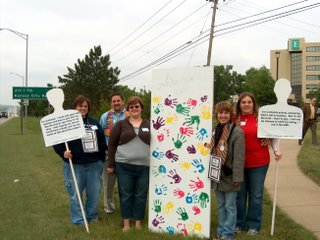
It's been a very interesting last few days for a United Methodist in Kansas City. On Wednesday the Judicial Council began their quarterly meeting here (actually in Overland Park since we have a the Chiefs as a Native American sports mascot) and on their list of things to consider was the possibility of reconsidering the decision (1032) in which a pastor was affirmed for deciding someone could not join the church, specifically because he's gay. There has been a lot of conversation about the decision itself (including here on this blog) but I want to talk more about what I experienced being present outside of the Judicial Council meeting room these last few days. The Reconciling Ministries Network (RMN) coordinated a prayerful witness of folks from around the country to let the Judicial Council know that this was something important and that we were prayerfully watching. We had a conference room right by the conference room in which they had their meeting and a group of us went outside (see picture above) to make a more public witness to what was going on inside. We even made it onto the local news (KCTV 5 was the only channel but they presented to situation well).
In the end, the Judicial Council invited us to have communion with them on their last day, Friday. It was interesting because this was not anything that had been done before and I was interested to see how it was going to be handled by all those involved. There were quite a few of us crammed into the conference room that morning, and many more of us wearing rainbow stoles than there were members of the Judicial Council. We sang songs, prayed, confessed our sins and shared the holy meal that, in this church, has always been open to all people. It was quite a feeling to know that after these people had discussed openness of the church we were sharing in the open table.
We still have no idea what the Judicial Council decided - they will post their decisions on their website Monday, and until then we are just waiting and continuing to pray. There were more than a hundred of us who came out in support of the RMN movement in this church, and I know that decision 1032 is not just a concern for those working on inclusion on LGBT people in church life - this is a huge theological issue for any church to decide who is in and who (if anyone) is out. Should people be excluded from the church? We'll see in a couple more days...